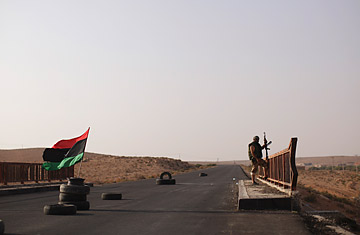
A rebel fighter stands at a checkpoint between Tarhouna and Bani Walid, Tuesday, Sept. 6, 2011.
On the road between the cities of Tarhuna and Bani Walid, Libyan rebels are trying to avoid a battle they are reluctant to fight. "We don't want to go in," says Abdallah Kanshil, who is tasked with negotiating Bani Walid's surrender. "But [former Libyan leader Muammar] Gaddafi's forces are leaving us no choice." Though Gaddafi fled the capital of Tripoli two weeks ago when rebels took the city, his loyalists have refused to accept defeat. They have regrouped in towns like Bani Walid, 95 miles (about 150 km) southeast of Tripoli, determined to make a last stand that rebels say will only spill unnecessary blood.
"I hope there is no fighting," says Ali Haraisha, a Bani Walid resident who joined the rebels outside the city in their makeshift camp. "We want no more blood and no more killing." The rebels' military leaders feel much the same way. They have been fruitlessly negotiating with Bani Walid notables for the past week. "We are trying. But the discussions are going nowhere," says an exasperated Kanshil.
Kanshil and other rebel officials say Gaddafi loyalists from throughout the country have made their way to Bani Walid, a town of about 100,000 inhabitants, in the past two weeks. They say the Libyan leader himself passed through 10 days ago and that his son Saif al-Islam distributed weapons to residents in preparation for an extended siege. "We know Gaddafi planned to make a stand here," says Muhammad Abd al-Aziz, a spokesman for the Bani Walid Transitional Council. "But we want to avoid this."
On Tuesday morning, Sept. 6, rumors spread of a secret deal that would send Gaddafi into exile. The speculation arose after two large convoys of military vehicles were seen darting across the vast Sahara in southern Libya late Monday, supposedly laden with weapons and gold, toward the country's long border with Niger. At least one convoy was reported to have crossed into Niger, according to the BBC correspondent in Niamey, that country's capital. Meanwhile, Reuters cited unnamed military sources in France and Niger as saying that about 200 military vehicles were driving toward Niger and that the move could represent one piece of a secret deal brokered, possibly with the involvement of France, to secure exile for Gaddafi in Burkina Faso, which neighbors Niger. An unnamed French military source told Reuters late Monday that Gaddafi and his son Saif al-Islam would join up with the vehicles and travel to Burkina Faso. Blaise Compaoré, the President of Burkina Faso, was trained in one of Gaddafi's schools for dissidents before he took power in a violent coup in 1987.
Such speculation and rumor fly in the face of Gaddafi's vow of staying on in Libya and fighting to the death. Indeed, his intransigence has complicated the establishment of the new regime. When rebel forces entered Tripoli on Aug. 21, Gaddafi's exit appeared assured. They took his sprawling compound, known as Bab al-Azaziyah, two days later. Libyans throughout the country rejoiced at the fall of the longtime dictator. But as they were celebrating, his loyalists retreated to areas where he retains significant support.
One such place is Bani Walid. For decades, Gaddafi recruited members of his security service from the Warfalla tribe, which resides there. A number of his close aides are from the tribe. Gaddafi patronized the Warfalla and Bani Walid throughout his 42-year rule, and it appears now that they are returning the favor.
Other longtime Gaddafi strongholdslike Sirte have also refused to surrender. Sirte is Gaddafi's birthplace and the home of his Gaddafa tribe. He placed members of his tribe in the most sensitive positions in his government, and he flooded the city with arms. Rebels originally gave the city until Sept. 3 to surrender but extended the deadline a week when it became clear that residents had no intention of doing so.
The rebels face the same problem in Bani Walid. Rebel negotiators, unable to make headway with the city's leaders, extended the deadline for its surrender to Sept. 10, as they did with Sirte. Abd al-Aziz, the rebels' Bani Walid spokesman, says that "100 die-hard [Gaddafi loyalist] snipers" concentrated in built-up areas are holding the city hostage. Other fighters said Gaddafi's support in Bani Walid is more widespread. "The people of Bani Walid like Muammar," says Ali Abu Mahir, a resident who defected to the rebels.
Though many rebels express misgivings about fighting, some are eager to do so. "We gave Gaddafi and his brigades enough chances," says Azuz Abd al-Aziz, holding a grenade to his head. "Tell them to come out." Others merely want the waiting to end. "We have been here too long," complains Mufta Ali. "Fight. Sit. Stay. We just want to have orders and carry them out."
But among those from Bani Walid, the prevailing sentiment is that nothing would be gained from a costly invasion. "If we fight now and kill people, there could be retribution and vengeance," explains Iyad Da'allah. "And why do we need this now, when the revolution is all but over?" Rebel officials appear to concur. Though negotiations have reached a dead end, they refuse to throw in the towel. Says Kanshil: "We are trying to get them to surrender little by little, from the bottom up." But with the city's residents rebuffing all their overtures, the rebels have may have no choice but to take the town by force.
— With reporting by Vivienne Walt / Paris
